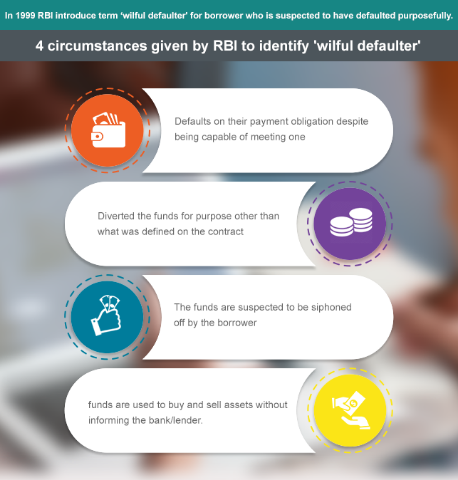Your financial health is as good as status of your credit report. How much you borrow doesn’t affect your credit worthiness unless you fail to pay back the dues.
Failing to pay your dues such as loan’s EMI, cards’ bill or any other credit outstanding is termed as “default.” The default literally bleeds your CIBIL score and credit worthiness. So you should always plan your loans and try to make payments before time. It not only helps you build your credit score but also makes you credit ready for future.
In 1999 Reserve Bank of India (RBI) classified “wilful” and “non-wilful” defaulters to delineate those who were deliberately using the banking system to not pay back dues from those who were genuinely fallen on debt trap.

There are ways for bad credit fix for those who want to repay and close the account.
However when a company or an individual is suspected to have defaulted purposefully, they are termed as ‘wilful defaulter.’
As per RBI, a person or a company is termed as “wilful defaulter” in any of the four circumstances given below:
1. When the borrower (individual or company) defaults on their payment obligation despite being capable of meeting one.
2. When the borrower is found to have diverted the availed funds for purpose other than what was defined on the loan agreement.
3. When the credit is not used for the purpose which it was borrowed and there is no justification of the use. The funds are suspected to be siphoned off by the borrower.
4. When the funds are used to buy and sell assets without informing the bank/lender.
Further when there are guarantors (to the wilfully defaulting unit) who too shy away from repaying the debit, they are also considered as wilful defaulters. If these guarantors conduct a CIBIL score check, their credit report will also show the red flag.
So a person or individual who defaults deliberately is marked as wilful defaulter as per RBI notification. Defaulting on the credit willfully is certainly regarded as an unwarranted offence by the apex bank and attracts penal measures.
Currently there are no stringent laws against Willful defaulters. But the central governing body of banks (which is RBI) has framed rules to define who the willful defaulter is and what process needs to be followed by the banks for declaring the defaulter as a “willful defaulter”.
The Securitisation and Reconstruction of Financial Assets and Enforcement of Security Interest (SARFAESI) Act, 2002 is the law that banks use to recover their loans. The law enables banks to auction residential and/or commercial assets/properties of the defaulter to recover the loans.
All banks and institutions deposit the list of wilful defaulters (suit-filed accounts) ending every quarter to Credit Information Bureau (India) Ltd (CIBIL). The credit agency (CIBIL) maintains a loan defaulter list where in it mentions the details about the defaulter.
The purpose of maintaining a loan defaulter list is to issue an alert against entities who have defaulted so that no other bank or financial institute issues credit to them anymore. In fact banks and financial institutions also share the names of current and earlier directors of the defaulters’ unit. The other banks and institute raise an auto alarm against the defaulters’ listed by credit agency.
The tag of willful defaulter blacklists the entity and no bank or institution deals with them.
Besides, they are also barred from starting new business for next five years from the date they are declared as wilful defaulter.
The lenders can start a legal process including the criminal proceedings against the borrowers and guarantors so as to expedite the recovery of funds.
In fact lenders (banks) have right to change the management of wilfully defaulting company.
So, once declared willful defaulter the person is completed locked to do financial or business activities. They may not start any financial matter anywhere.
You can check the CIBIL database to check the name of defaulters. The list of defaulters is maintained by CIBIL year wise under “suit filed cases” on its official website. Currently CIBIL maintains a database on suit-filed accounts on classification of Rs 1 crore and above, and that of (wilful defaulters) Rs 25 Lacs and above.
The borrower too has a right to challenge the bank if s/he thinks that their name shall not be included in the list. But it is certainly not easy to erase the name from the list of defaulters.





Sir,My Pan card is comes under the redflag by rbi instruction,bcz i was unable to pay my emi’s on time,but on nov 2019 i cleared all my due,how can i rectify this red flag from my pancard